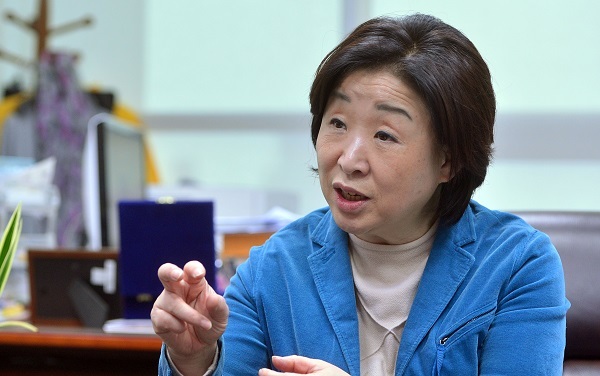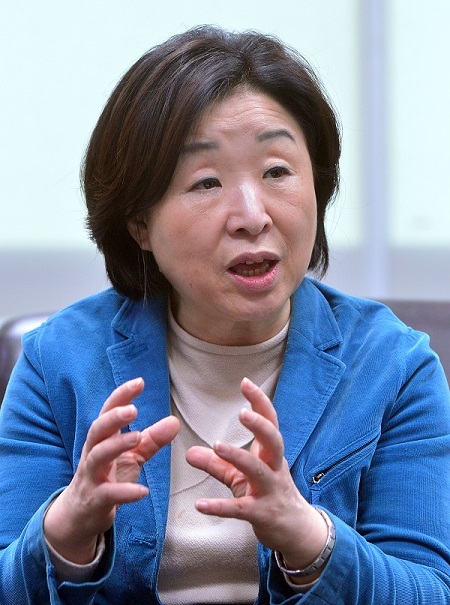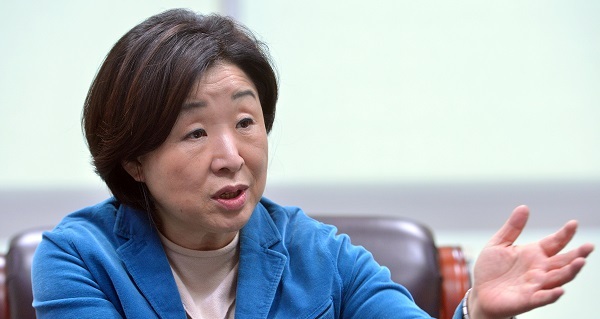Overshadowed by the two establishment camps -- conservatives and moderate liberals -- progressive leftists have rarely been a major player in Korea’s history of presidential elections, with their approval ratings hovering around 5 percent.
For the progressive left’s flag-bearer Rep. Sim Sang-jeung, however, the upcoming May 9 election is about more than just victory or a turnover of power. Despite a relatively low chance of winning, Sim is committed to freshening the political climate by emboldening reform-minded voters and harnessing society’s zeal for responsible, more trustworthy politics.
“I will not drop out from the race nor join hands with other opposition runners for a unified single candidacy. I will finish the race no matter what,” Sim of the Justice Party told The Korea Herald at her office in the National Assembly in Seoul.
Sim, 58, said her third attempt for the presidency is different in many aspects. The party has managed to shake off the label as “North Korea sympathizers,” while upgrading its security and socioeconomic policies in a more practical manner so as to represent the average citizens interests.
 |
Rep. Sim Sang-jeung |
She was defeated in the party’s 2008 primary and dropped out of the 2012 election to endorse the then main opposition party’s candidate, Moon Jae-in, who lost to now-impeached former President Park Geun-hye by a slim margin.
“The progressive politics we pursue is to compete for responsibility, not radicalism or boldness. I’m running because I think it is about time for our party to govern,” Sim said. “Therefore, it’s virtually my first presidential bid.”
This year’s early election, slated for May 9, is taking shape through a more unconventional chain of events, triggered by the ouster of former President Park over a massive bribery scandal involving her longtime friend, presidential aides and business conglomerates.
The Justice Party, despite being the first to push for Park’s impeachment as its official platform, is struggling to boost its popularity amid the post-impeachment whirlwind that shone a spotlight on the liberal frontrunner Moon of the Democratic Party of Korea.
To stay relevant in the race, the former labor activist said her campaign will focus on bringing back what she described as “shy progressives,” who actually have progressive inclinations but have voted for mainstream parties out of fear that their ballots are discounted.
“It had been difficult for us to convince ‘shy progressives’ to return to our base. Although they believed in our value in theory, they chose not to join us in reality. But I think it is time for them to return and once they return, they would never go back again.”
“Currently, the voters feel very strongly about the need for change, and they are drawn to parties and candidates who can achieve it in a short period. I think there is doubt how far the Democratic Party could go. So our mandate is to prove to the people that we can deliver.”
 |
Rep. Sim Sang-jeung |
Sim’s Justice Party is the only political entity to publicly advocate for the right of minority groups such as homosexuals, labor unions, women, and even animals. She has put forward various legislations aiming to protect the minority.
Among the most popular one is “anti-discrimination law,” which aims to ban any form of discrimination against the people based on race, gender, age and sexual orientation and among others. But the bill failed to clear legislative hurdles as some lawmakers opposed it, saying it would encourage homosexuals.
Despite legislative failure, Sim vowed to push the agenda. Her campaign incorporated the enactment of an “anti-discrimination law” into their election pledge and pledged to enact a bill that allows gay couples to register as legitimate couples.
“The anti-discrimination law is the basic law for a country who values democracy and human rights. I don’t think it is right for me to give up on the bill simply because I could lose votes. It’s an issue that goes beyond political calculation. It’s about responsibility of a country.”
While acknowledging that her party was branded as pro-North in the past, which she argues is an antiquated stereotype established by ultra-conservative groups, Sim made it clear that her party has moved beyond it.
“When it comes to North Korea issues, I think we have turned a new leaf,” she said, stressing her landslide victory in the 2016 general election in Goyang, Gyeonggi Province, which nears the border with North Korea.
“I think there was an internal reason for us failing to become a mainstream party. There was a robust party overhaul to allow the party to take the rational and principled platform. There are some who place such a label on us, but I think we have moved beyond that.”
Yet Sim pointed out that many former South Korean leaders, whether they are liberals and conservatives, leaned toward the US too much without a shrewd strategy to find a balance between regional powers.
Despite its security reliance, Seoul needs to speak out against the US over controversial issues, such as the decision to deploy a Terminal High Altitude Area Defense system battery here, she said.
“I was often told that you should never say something negative about the US if you want to become a successful politician in the US. But I don’t agree with that. You shouldn’t become a president if you can’t say ‘No’ to the US,” she said.
 |
Rep. Sim Sang-jeung |
Having devoted 25 years of her life to the labor movement, she was on the wanted list for the longest time among female politicians. From 1984 and 1993, she was on the run for leading the campaign to form labor unions, which was illegal in the 80s when authoritarian leaders ruled South Korea.
Such a track record prompted her supports and pundits to refer to Sim under different names. Those who focus on her activist side prefer to call “Sim d’arc,” named after Jeanne d‘Arc. Others describe her as “Sim-vely,” a combination of her last name and a syllable of the word “lovely” to highlight her personal charm.
Sim now wants to add a new nickname to the list: Angela Markel of South Korea. Just as the German Chancellor reached across the aisle to build a coalition government, the only female presidential candidate vowed to create a political landscape where dissenting voices are respected.
“The failure of former President Park Geun-hye should not translate into the failure of female politicians... I am now focusing on Chancellor Markel, who can negotiate a deal without compromising her political conviction. I think that is the kind of leadership required of South Korea,” Sim said.
By Yeo Jun-suk (
jasonyeo@heraldcorp.com) and Jo He-rim(
herim@heraldcorp.com)










